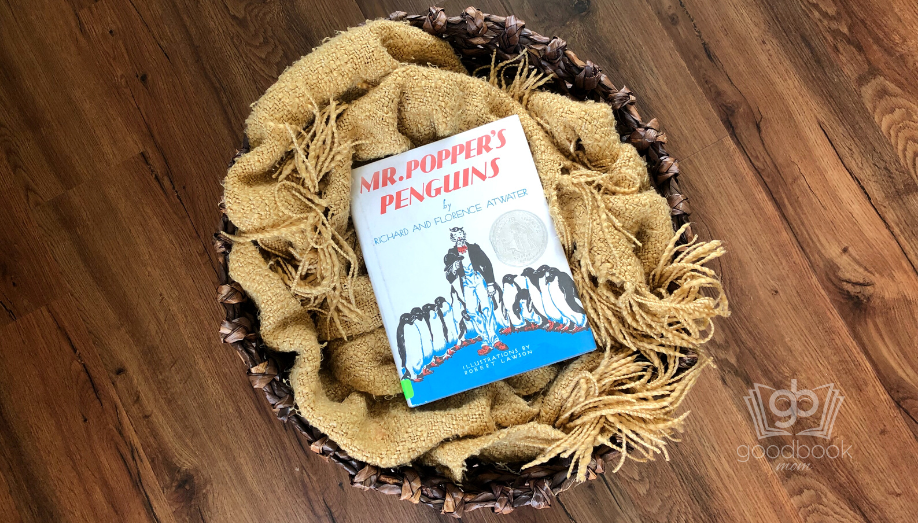
Summary
Mr. Popper’s Penguins is a classic, Newbury Honor Book in which imagination comes to life. Written and set in 1938, Mr. Popper leads a quiet life in Stillwater, Minnesota, as a house painter. Working primarily in the warmer months, he struggles to provide financially for his family during the winter off-season. While Mr. Popper enjoys his town and occupation, he dreams of adventure and exploring the world, specifically the North and South Poles.
Mr. Popper indulges this dream by reading books and listening to a radio program broadcasted by Admiral Drake, the leading Arctic explorer. To his surprise, Mr. Popper tunes into the radio program only to hear Admiral Drake specifically reference a letter Mr. Popper had written to him. Mr. Popper receives a box at his front door from Admiral Drake containing a live penguin. Mr. Popper names the penguin Captain Cook, and the whimsical story of a penguin living inside a small home unfolds.
Captain Cook’s health begins to fail, so Mr. Popper inquires with a curator at an aquarium. The curator sends the Popper family a second penguin, who they name Greta. Greta lays 10 eggs, and the Poppers end up with 12 penguins. This puts a strain on the Popper’s already tight financial budget.
As a solution, the Popper’s teach the penguins to perform a theater act. The Poppers and the penguins tour the country performing this act, and the audiences adore the show. In an unfortunate mixup, Mr. Popper performs at the wrong theater, landing himself and the penguins in jail. He is shocked when Admiral Drake appears and posts bail for Mr. Popper and the penguins. Admiral Drake proposes a plan to take the penguins to the North Pole, and Mr. Popper, knowing a warm spring is coming, agrees. Mr. Popper then decides to accompany Admiral Drake and his beloved penguins on the journey to the North Pole for a span of one to two years.
Reading Level: Ages 8-12
Read Aloud: Ages 6+
Mom Thoughts
Mr. Popper’s Penguins is fun-filled, creative, and allows the reader to imagine what life would be like caring for a penguin. The book moves quickly with no “filler” chapters, which keeps young readers engaged. It was also refreshing to experience the culture of 1938 throughout the text, in which the children respected their father for his role of authority, Mrs. Popper saw to the needs of her family and cultivating her home, and the children could easily take time away from schooling to spend time with their family.
Though consistent with the time period in which it was written, there are some instances regarding gender that may confuse young readers. For example, the penguins are said to look “silly and girlish,” when wearing firefighter hats on their heads. Additionally, at the suggestion of calling the theater act Popper’s Pink-toed Penguins, Mr. Popper replies, “that sounds too much like chorus girls or ballet dancers, and these birds are pretty serious.” Lastly, when an interviewer asks if the penguin is a he or she, Mr. Popper says that he calls the bird Captain Cook. “That makes it a he,” respondes the reporter.
Having read this book as a young child, I did not realize how often the family’s finances are discussed. Mrs. Popper is always the person most worried about finances. At one point, she seems to seriously consider eating the penguins due to lack of food. The children recognize they will be eating beans for dinner all winter even before the penguins arrive and put more strain on the family. The book does resolve with a payout from a short film that allows the Poppers to live comfortably in their home, but this topic may be something to discuss when reading it to younger children.
Language:
The noises the penguins make are frequently referred to as “gook.” Captain Cook’s body is referred to as a “plump figure,” who has a “fat throat.” “The term “fat and sleek” is used positively to refer to the penguin’s health returning. A tightrope walker calls the penguins, “stupid things.” The book uses the classical definitions of the terms: erect, queer, heathen, gay, and gaily.
Questionable Behavior:
Mr. Popper smokes a pipe. Mrs. Popper is a little sharp with Mr. Popper due to tight finances. Bill taunts a police officer who is afraid of Captain Cook. On a train, an annoyed clergyman suggests the penguins jump out of the window. Mr. Popper gets arrested and stays in jail. Penguin Violence: Mrs. Popper spanks Captain Cook on his head; Bill spanks him as well. Two penguins are encouraged to fight with each other as part of the theater act which includes the penguins punching and hitting in the eyes.
Sexual Content:
Mr. Popper kisses his wife. A penguin investigates the striped stockings under a woman’s dress. The penguins hide from Mrs. Popper under a lady’s skirt, causing her to shrill. Changes in breeding habits result in Greta laying 10 eggs as opposed to the normal 2.
This review is written by Emily Russell. To learn more about Emily, click HERE.
This post may contain affiliate links. Please read our disclaimer for more info.
Buy This Book
At A Glance
| Number of Pages | Number of Chapters |
|---|---|
| 160 | 14 |
